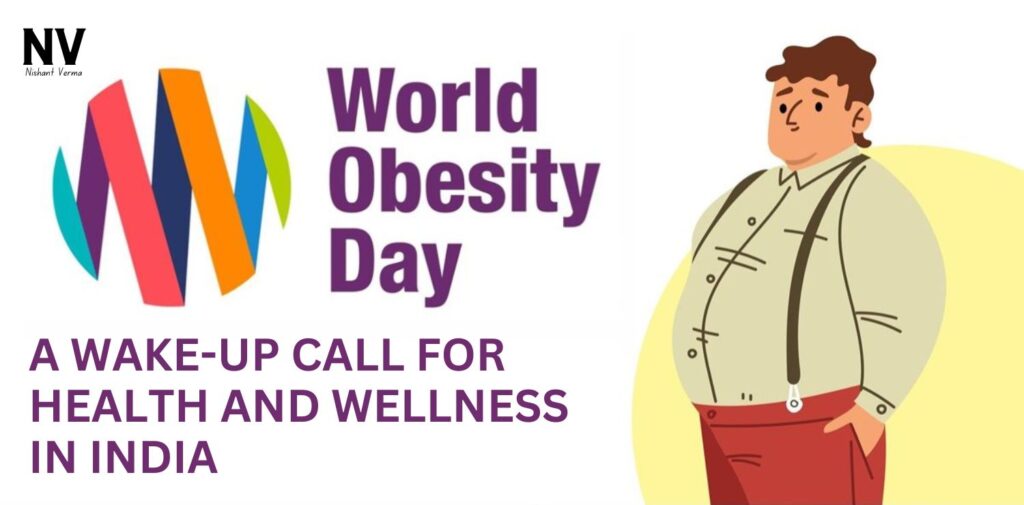World Obesity Day is an important day observed globally to raise awareness about obesity, its consequences, and the need for people to adopt healthier lifestyles. In India, where lifestyle diseases like obesity are becoming more common due to rapid urbanization and changing diets, this day is a reminder of the need to focus on better eating habits, physical activity, and overall health.
Obesity is a growing concern worldwide, and India is no exception. With an increase in sedentary lifestyles, unhealthy eating habits, and rising stress levels, more people are struggling with obesity, leading to an increase in associated health issues such as diabetes, heart disease, and high blood pressure. World Obesity Day plays a crucial role in addressing these concerns, and it provides a platform for individuals, healthcare professionals, and governments to discuss solutions.
What Is Obesity?
Obesity is a condition characterized by excessive body fat that may negatively affect a person’s health. It is usually measured using the Body Mass Index (BMI), which is a ratio of a person’s weight to their height. If a person’s BMI is 30 or higher, they are considered obese.
Obesity can lead to various serious health problems. It is a risk factor for many chronic diseases such as heart disease, stroke, high blood pressure, type 2 diabetes, certain types of cancer, and even depression. Therefore, managing and preventing obesity is important to lead a healthy life.

Why Is World Obesity Day Important?
World Obesity Day is observed every year on March 4th. The primary aim of this day is to spread awareness about the dangers of obesity and to encourage people to take action. In India, the number of people living with obesity has increased significantly in recent years. According to the National Family Health Survey, more than 20% of Indian adults are overweight or obese, and this number is rising every year.
The day serves as an important opportunity to highlight the risks of obesity and the actions that can be taken to prevent and manage it. It also encourages individuals to make healthier lifestyle choices, such as improving their diet, engaging in regular physical activity, and seeking medical advice when necessary.
The Growing Obesity Crisis in India
Obesity is no longer just a problem in developed countries, it is also becoming a significant issue in India. Rapid urbanization, increased use of technology, and changing food patterns are contributing to the growing obesity problem in the country. Traditionally, Indian diets were based on fresh vegetables, fruits, legumes, and whole grains, but over the years, there has been an increase in the consumption of processed foods, sugary drinks, and high-fat snacks.
In urban areas, busy lifestyles and long working hours often leave little time for physical activity. As a result, many people lead sedentary lives, relying on fast food and junk food for quick meals. These factors, combined with high levels of stress and poor sleep, have led to an increase in obesity rates, especially in younger generations.
Obesity not only affects a person’s physical health but also their mental well-being. It can lead to feelings of low self-esteem, depression, and anxiety. It is important to recognize that obesity is not just about appearance but about overall health, and addressing it can improve the quality of life for many individuals.
Health Risks Associated with Obesity
Obesity is linked to several serious health problems. Some of the common health risks associated with obesity include:
- Type 2 Diabetes – Obesity increases the risk of developing type 2 diabetes, a condition where the body cannot properly regulate blood sugar levels. People with diabetes are at a higher risk of heart disease, kidney problems, and nerve damage.
- Heart Disease and Stroke – Excess fat in the body can lead to high blood pressure, high cholesterol, and other factors that increase the risk of heart disease and stroke.
- High Blood Pressure (Hypertension) – Obesity can put extra strain on the heart and blood vessels, leading to high blood pressure, which is a major risk factor for heart disease and kidney problems.
- Joint Problems – Carrying extra weight puts additional pressure on joints, especially the knees, which can lead to conditions like osteoarthritis.
- Sleep Apnea – Obesity can lead to sleep apnea, a condition where breathing stops and starts during sleep. This can lead to poor sleep quality and other health complications.
- Cancer – Obesity is associated with an increased risk of several types of cancer, including breast, colon, and liver cancer.
- Mental Health Issues – People with obesity may experience low self-esteem, depression, and anxiety due to societal pressures, body image concerns, and health issues.
Given these serious health risks, it’s crucial to address obesity and work towards its prevention and management.

The Importance of Healthy Eating
One of the main causes of obesity is poor dietary habits. The modern diet, which is high in processed foods, refined sugars, and unhealthy fats, is a key contributor to weight gain. However, adopting healthy eating habits can significantly reduce the risk of obesity and its associated diseases.
In India, many traditional foods are rich in nutrients and offer a balanced diet. For example, foods like whole grains (such as brown rice, oats, and wheat), legumes (lentils, chickpeas, etc.), vegetables, fruits, and healthy fats (like ghee and coconut oil) can help in maintaining a healthy weight. Consuming smaller portions, avoiding overeating, and eating more home-cooked meals rather than relying on fast food can have a positive impact on one’s health.
Drinking plenty of water, avoiding sugary drinks, and reducing salt and sugar intake are also important steps toward a healthier diet. It’s essential to focus on eating a balanced diet that includes all the essential nutrients, rather than focusing on extreme diets or quick fixes.
The Role of Physical Activity
Another important factor in preventing and managing obesity is physical activity. Regular exercise helps burn calories, improve metabolism, and strengthen muscles and bones. It also has numerous benefits for mental health, such as reducing stress, improving mood, and increasing energy levels.
In India, traditional forms of exercise like yoga, walking, and dancing can be great ways to stay active. Yoga, in particular, is a widely practiced activity in India and has numerous benefits for both the body and mind. Additionally, taking the stairs instead of the elevator, walking or cycling to nearby places, and engaging in outdoor activities like sports and gardening can help increase daily physical activity levels.
For those who are new to exercise, it is important to start slow and gradually increase the intensity. A combination of aerobic exercises (like jogging, swimming, or cycling) and strength training (such as weight lifting or bodyweight exercises) is recommended for overall fitness.
Mental Health and Obesity
Mental health plays a significant role in obesity. Stress, anxiety, depression, and other mental health issues can contribute to unhealthy eating habits, lack of physical activity, and poor sleep, which in turn can lead to weight gain. It’s essential to address both physical and mental health when managing obesity.
In India, mental health awareness is growing, and more people are realizing the importance of seeking help for mental health issues. By addressing mental health, individuals can improve their relationship with food and exercise, making it easier to maintain a healthy weight.

How to Combat Obesity: Steps for a Healthier Lifestyle
- Balanced Diet – Focus on eating whole, nutritious foods, and reduce your intake of processed foods, sugary snacks, and drinks.
- Exercise Regularly – Aim for at least 30 minutes of physical activity every day, such as walking, jogging, or yoga.
- Stay Hydrated – Drink plenty of water throughout the day to stay hydrated and avoid sugary beverages.
- Get Enough Sleep – Aim for 7-8 hours of sleep each night, as poor sleep can contribute to weight gain.
- Manage Stress – Engage in stress-relieving activities like meditation, deep breathing, or spending time in nature.
- Seek Support – If needed, consult a healthcare professional or a nutritionist for personalized guidance on managing weight.
Conclusion
World Obesity Day is a reminder for everyone to pay attention to their health, particularly their weight and lifestyle choices. In India, where obesity rates are increasing, it is more important than ever to raise awareness about the risks of obesity and the benefits of adopting a healthy lifestyle.
By making simple changes to our diet, exercise habits, and overall lifestyle, we can reduce the burden of obesity and its associated health problems. It’s not just about looking good; it’s about feeling good and living a long, healthy life. Let’s use World Obesity Day as a starting point to commit to better health for ourselves and our loved ones.




